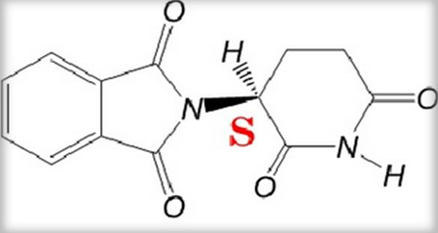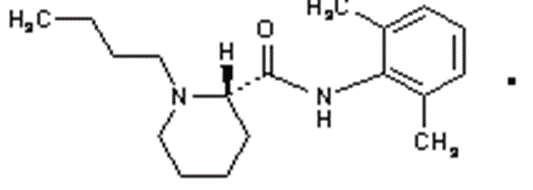CHIRAL DRUGS
Contents
• Chiral drugs
• Chiral inversion
Intended
learning outcomes
At the end of this
lecture, student will be able to:
Describe the importance of stereoisomerism in drug activity
and drug design.
CURRENT
STATUS OF CHIRAL DRUGS
1987
• 57% marketed drugs were chiral.
• 2% single enantiomers.
2006
• 80% drugs approved by the FDA were chiral.
− FDA now requires information about the structure and activity
of each isomer present in a racemic mixture of a new medication.
− In 2000, 40% of drugs on sale in the US were single
enantiomer-based.
− In 2004, about 80% of drugs entering market are single
enantiomer variants.
What
sparked the change????
• 1987 – change in FDA regulations.
• Inclusion of information on the enantiomer composition of
chiral compounds in new-drug applications.
THALIDOMIDE
• One asymmetric carbon atom, exists as 2 enantiomers
• S-Enantiomer → sedative
• R-Enantiomer → Teratogen
S thalidomide
â
Sedative
R thalidomide
â
Teratogen
Chiral
Inversion
• Unique metabolic pathway.
• Enzymatic or non-enzymatic.
• Involves unidirectional conversion of one enantiomeric
form to another.
R → S
CHIRAL
SWITCH
• Development of a single enantiomer from a previously
marketed racemate.
• Resulted in a number of agents being re-marketed as chiral
drugs.
• Same or similar therapeutic indications.
β2
ADreNErgic recePTOR AGONIST
Salbutamol
• Salbutamol →Mixture of (R)-salbutamol and (S)-salbutamol
• Levosalbutamol is the (R)-enantiomer → active bronchodilator.
Racemic and
(S)-Salbutamol
• Induce airway hyper responsiveness.
• Increase sensitivity to allergen challenge.
• Inhalation of levosalbutamol
→ greater bronchodilatation than the
CALCIUM
CHANNEL BLOCKER
Verapamil
• (S)-verapamil: vasodilating, cardiac antidepressant
properties.
• (R)-verapamil: a vasodilating drug.
• Verapamil blocks the P170 glycoprotein.
• R-verapamil might be expected to be more beneficial.
S-AMLODIPINE
• S-Amlodipine → active calcium channel blocker.
• R-Amlodipine → inactive as calcium channel blocker.
• Mainly responsible for peripheral edema.
• Treatment of hypertension.
• S-Amlodipine is effective at half the dose of racemate.
• Incidence of peripheral oedema is negligible.
• Treatment of normotensive angina patients.
• S-Amlodipine is effective at half the dose of racemate.
LOCAL
ANAESTHETIC
Levobupivacaine
Cardio toxicity of the drug: R-enantiomer.
• Levobupivacaine – ‘S’ enantiomer of Bupivacaine.
• Moderately more potent.
Levobupivacaine is less cardiotoxic.
SELECTIVE
SEROTONIN REUPTAKE INHIBITOR
Escitalopram
• S-enantiomer of Citalopram.
• Doses that show improvement in depressed patients.
10 mg / day – ‘S’ enantiomer
40 mg / day – racemate
• Other advantages of Escitalopram.
• Faster onset of action.
• Reduction in side effects.
• Improved tolerability profile.
NON-STEROIDAL
ANTI-INFLAMMATORY DRUG
Dexibuprofen
• Inhibition of cyclooxygenase activity – ‘S’ enantiomer.
• 60% of R enantiomer undergoes chiral inversion to the active
S-enantiomer.
• chiral Dexibuprofen (1200 mg daily) was better than
racemate (2400 mg daily).
• Highly effective NSAID.
• Low adverse effect profile.
ADVANTAGES
OF CHIRAL DRUGS
• Chiral drug is a single agent instead of a mixture of two
distinct drugs.
• Simplifies the interpretation of the Basic Pharmacology.
• Greater selectivity for their biological targets improved therapeutic
indices and reduced adverse effects.
• Longer or shorter duration of action – more appropriate
dosing frequency.
• Decreased inter individual variability.
SOME DRUGS
ARE BETTER AS RACEMATES
β BLOCKERS
• β blockers currently used contain at least one chiral
center.
• Most are marketed as racemates.
SUMMARY
• FDA now requires information about the structure and
activity of each isomer present in a racemic mixture of a new medication.
• In 2000, 40% of drugs on sale in the US were single
enantiomer-based.
• In 2004, about 80% of drugs entering market are single
enantiomer variants
• Chiral inversion of drug molecules and its effect is
studied.




